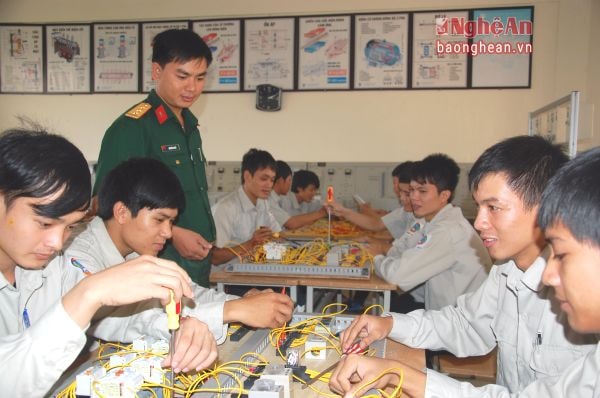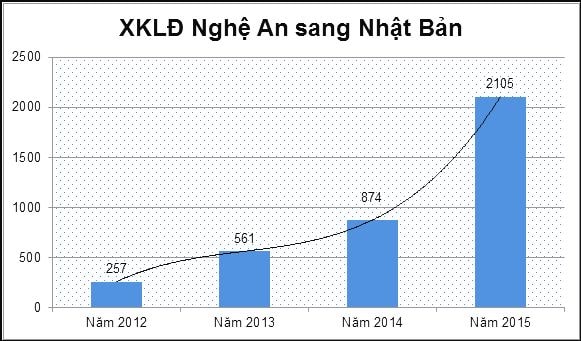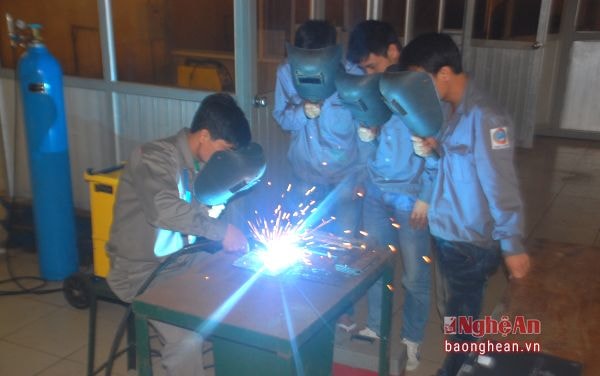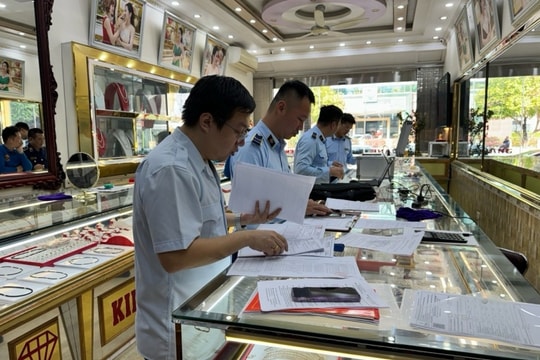Creating human resources to not 'miss appointments' with Japanese businesses
(Baonghean) - Vocational training in Nghe An is making many efforts to innovate to ensure output meets the requirements of foreign employers, especially Japanese enterprises.
Golden opportunity
Japan is known as a developed country, the world's third largest economy with high levels of science and technology. However, the land of the rising sun is struggling with the problem of an aging population, which means the workforce is shrinking.
Companies and businesses here are looking for quality human resources from outside, attracting workers from other countries to work in Japan or researching and implementing business models in other countries to take advantage of abundant labor resources and cheaper labor in the host country.
 |
| Lecturers interact with students during class at the Faculty of Electricity, Vocational College No. 4 - Ministry of National Defense. |
 |
| Situation of Nghe An labor export to Japanese market (unit: person) |
For Vietnam in general and Nghe An in particular, this is truly a "golden opportunity" that the young workforce is seeking to seize and take advantage of, through improving their expertise, professionalism, foreign language skills and soft skills to meet the requirements of foreign employers.
A good fact, according to statistics compiled across the province, recently the situation of sending Nghe An workers to work in Japan has shown positive signs, with the number increasing dramatically compared to previous years, from 561 people in 2013, to 874 people in 2014 and especially 2,105 people in 2015.
Nghe An workers have every reason to be optimistic in the coming time, especially when the report on labor export results in the first 6 months of 2016 by the Department of Labor, War Invalids and Social Affairs continues to confirm the above trend. Specifically, 1,062 Nghe An workers, of which the number of workers from the plains and mountainous areas is 806 and 256 respectively, were sent to work at factories, companies and enterprises located in Japan in the past 6 months, providing stable jobs with a good income compared to working in the country or many other labor export markets. This shows that the Japanese market has begun to "open its doors" more widely to Nghe An workers.
On the other hand, the wave of Japanese enterprises investing in production and business in Vietnam is also increasing, and the Nghe An labor market with its young structure and many advantages such as being sharp, hard-working and eager to learn is "catching the eye" of employers. Many Japanese business delegations have come to Nghe An to survey investment; Nghe An also sent many delegations of officials to Japan to study and seek cooperation opportunities.
These activities show that the cooperative relationship between Nghe An and Japanese enterprises is growing, which means opening up job opportunities for many workers. However, the requirements from Japanese enterprises for workers are not easy, if not quite high.
Mr. Yoshinaka Kazuo - Director of YH Seiko Vietnam Joint Stock Company, specializing in designing and manufacturing molds, mold components, and plastic molding, recently shared during a business trip to Nghe An: “Whether for the position of engineer or worker, we always focus on professional knowledge and proficient skills. We also strive to convey our advanced techniques to Vietnamese workers, so we give priority to candidates who are eager to learn and communicate fluently in Japanese. Those who wish to work for Japanese enterprises should note that the more fully equipped with necessary knowledge and skills, the higher the chance of being recruited.”
Change to adapt
Grasping the needs of Japanese enterprises, many universities, colleges and vocational schools in the province have proactively built teaching and learning programs to meet "Japanese standards", gradually making positive changes.
 |
| Practice hours at the Faculty of Mechanics of Vocational College No. 4 - Ministry of National Defense. |
At Van Xuan University of Technology, starting from the 2016-2017 school year, students upon admission will sign a commitment with the school and Japanese enterprises to be guaranteed stable employment after graduation if they meet the following conditions: completing the study program, achieving the full course training results of Good or higher, having a Japanese language certificate according to international standards, good health and ethics.
In addition to the traditional professional training program, Van Xuan University of Technology focuses on equipping students with social knowledge and creating opportunities for them to gain practical experience in working environments.
Mr. Nguyen Luu Thuy - Principal of the school said: "Understanding the needs of Japanese enterprises, we have included Japanese in the curriculum, along with many other subjects so that students can soon approach Japanese corporate culture, living and working style. Students will shorten their summer vacation and instead do internships and training right in the corporate environment. After 3 years of studying at the school, each student will have the opportunity to do an internship for 1-3 years in Japan, which will help them mature and accumulate experience and finance."
Besides Van Xuan University of Technology, Vocational College No. 4 - Ministry of National Defense located in Vinh City is also one of the units that "catch the wave" quite promptly to the demand from Japanese investors.
Regarding this trend, Colonel Ho Xuan Thang - Head of the school's Political Department said: "The school has determined that cooperation with Japanese partners in particular and international cooperation in general in vocational training is currently a suitable and necessary direction. On that basis, the school is taking the first steps in cooperation with a number of Japanese enterprises. The two sides have had meetings, investment surveys, and promising cooperation. In the coming time, this trend will continue to be focused on by the school and promises to bring students many job opportunities at Japanese enterprises."
In fact, besides good skills and solid expertise, proficiency in Japanese is one of the big “plus points” of candidates in the eyes of employers. Therefore, the school is promoting the establishment of a Japanese Language Center, building a team of good lecturers and suitable programs to soon put into teaching for students.
With relatively thorough and careful preparation, it can be expected that the schools will reap many sweet fruits in the implementation phase of cooperation programs and plans, training a new generation of workers with perfect knowledge and skills, meeting the strict input requirements of employers. Once the cooperation becomes real, there will no longer be cases of Nghe An workers regretfully "breaking appointments" with Japanese enterprises.
Phu Binh - Hoai Thu
| RELATED NEWS |
|---|

.png)


.jpg)


.jpg)
